If you’ve ever wanted to build your own Ancient Roman Empire, then this game is for you.
Citadelum is a Roman themed city builder, with some strategy combat too, that sees you build up a colony and attempt to appease the Gods.
In this article, we’ll be giving a full review of the game and ranking it from decaf to fully caffeinated.
Want to watch the video instead? Find it here
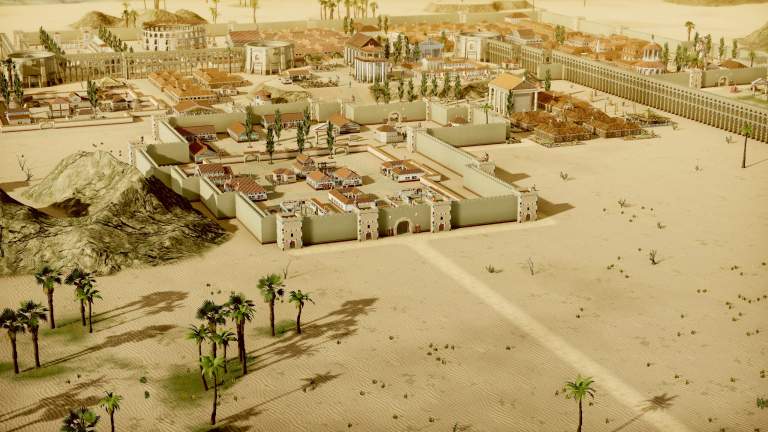
Story
The campaign mode of Citadelum takes you on a journey throughout Ancient Italy, seeing you navigate different scenarios whilst exploring different parts of Italy.
While the story provides the backdrop for the gameplay in terms of map design, it’s pretty hands off during the actual levels themselves. What we do have instead is a rich world environment full of lore, that includes a ton of cultural references to the settings, and of course the Gods themselves.
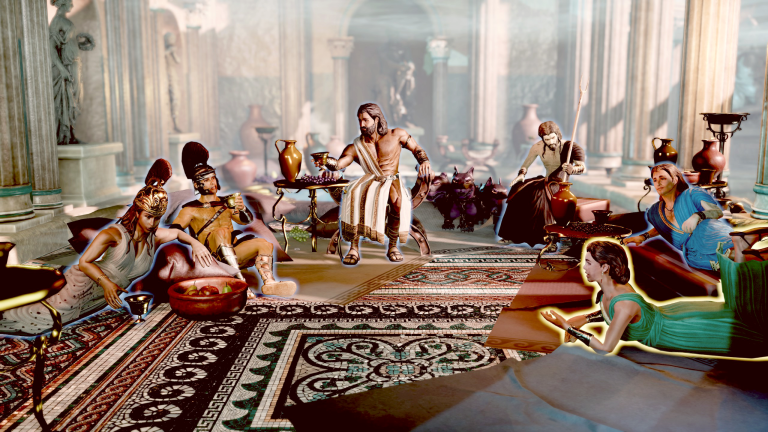
The inclusion of the Ancient Gods is done in a way that adds to the world without being overbearing, with each God representing a different resource, that fits with the God themselves. I particularly loved the objects you can find at times when exploring the map, and the lore that each has attached, and felt it really gave the game that little bit of extra intrigue.
This is a game that isn’t story heavy, but has one that sets up the missions and enriches the gameplay. So for Story I’m rating Citadelum as Buzzed.

GAMEPLAY
Citadelum really shines in the gameplay, and is a game that is easy to pick up and hard to put down. If you love the Age of Empires style campaigns, you’ll find Citadelum has a similar kind of structure, giving you campaigns to complete with different goals, but has more of a resource focus than a military one.
You’ll begin by building your forum, and then you’ll need to build housing to attract residents. There’s two main type of residents, Plebians and Patricians, and both have different housing and different needs, and the houses can be levelled up, which in turn changes their needs too. All residents require access to a market to get food, but you’ll find different resident types and housing levels require different types of food. Patricians are required to pay taxes, so you’ll need to build a tax office to allow them to pay, and all residents require a level of entertainment, requiring buildings like Baths and Taverns. You can level up your buildings by hitting their needs, and ensuring their desirability levels are high enough by placing decorative items around them, but levelling them up also increases the resources they need, so make sure you check that you’re covering all the bases.

To be able to build you’ll of course need resources. The main resources in this one are stone, iron, and wood, which can be refined into other materials, and you’ll also need to ensure you’ve got enough coin to build too.
Water is vital to your city running smoothly, so you’ll need to build reservoirs and connect them up to a water source by some pretty iconic looking aqueducts. Water is also needed by your fire stations, as fires will break out from time to time, and you’ll need to ensure you’ve got firemen on standby to put them out. You’ll also need to hire engineers to keep your buildings maintained, otherwise they will literally collapse.
In terms of food there’s a range of different vegetables, fruit and grains you can grow. Wheat is one of the pillars to your city, allowing you to later bake bread, and grapes are needed to craft wine, which is needed to fuel your taverns. You’ll also unlock livestock as you progress, which allows you to build pig, chicken, and cow farms, as well as fishing docks. All resources need a way to be stored, so you’ll need to build granaries and warehouses, which each have a ranged zone, to be able to get the maximum production values from each farm or mining camp.

Now each of your residents not only needs their needs met, but they also need a job, and you’re able to completely control your workforce, assigning your citizens to different roles. This is one of my favourite features in the game, which you can manage from the resource management window, as the amount of workers you have in each workplace determines it’s output. I really loved the reliability of resource production in this game, as it doesn’t really feel like you’re grinding anything, or that putting extra workers on isn’t worth it.
Once you’ve got the basics of your city running it’s time to turn your eyes to the skies and make sure you’re appeasing the Gods. You can build each God a temple, which unlocks the ability to perform sacrifices, and hold festivals in their honor – both of which increase their favour. Certain story events will also help increase favour, and when their favour is maxxed out you can receive a blessing which is unique to each God. If you don’t pay attention to the Gods and they become upset…well it can have some dire consequences.

Outside of your city exists an entire world to explore, and you’ll be able to send your explorer to discover new territories on the region map. Some of these territories will hold ancient relics, some will be empty, and in others you’ll find cities or enemy armies.
Discovering cities unlocks the ability to trade with them, which can be vital to keeping some money in your pocket, and it also allows you to purchase goods you may not be able to make yourself yet.
To take on the enemy armies, you’ll need to build your own forces, recruiting soldiers and training them up at the different training buildings. Once you’ve got enough men, you can deploy your legion and take to the battlefield.
The battle combat in the game definitely leans more to the simple side, giving you the ability to arrange your forces, and then send them out with the rest being done in an auto-battler style. Generally, if you have more men, you’re more likely to win, and winning will unlock that territory for you.

You can also take on enemy attacks at your city itself, so you’ll need to train guards, and build guard posts throughout your city, just in case. There’s also some cool castle style walls you can build to help keep enemies out, and protect your citizens.
Overall, Citadelum has a lot to love in terms of it’s gameplay. The game really feels well balanced, and addresses a lot of the typical pain points you find in these types of game. The quick building time is incredible, and really increases the pacing of the game, and it feels like what you build actually produces resources proportionately, so you don’t need to be excessive in your building.
It’s not a game that feels like you really need to grind, and it feels like any action you take, you see the impact of pretty quickly, which is a really great feature in this type of game.
They’ve nailed the balance and mechanics, so for game play I’m rating Citadelum as Fully Caffeinated.

DESIGN
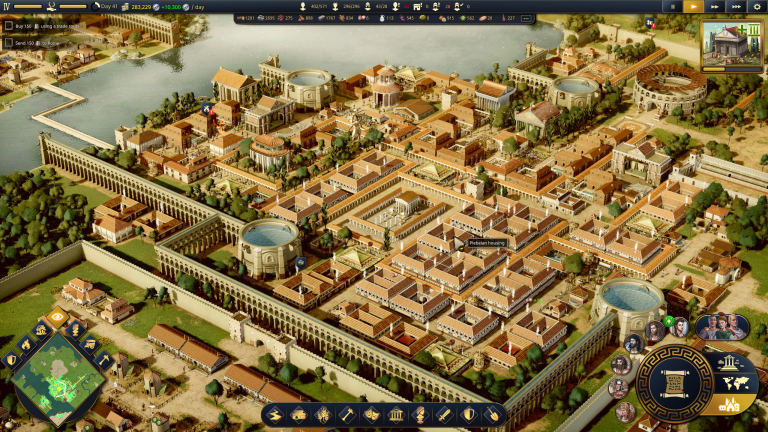
Even at a quick glance you can tell that Citadelum is a game set in Ancient Rome. The use of the iconic reservoir buildings, the temples, and the other main buildings all set the Roman stage in this game perfectly, and the design really compliments and conveys the theme well.
This is absolutely a game that shines in the little details. I really loved the way the buildings all open up when you hover over them, giving you an insight into how your citizens are living or what they are doing, and the differences between each building really make each feel unique.
The soundtrack is the perfect building partner, giving you a soundscape and sound effects that build an immersive game world, and provide you with just enough information about what’s happening in your city.
This is a game that definitely nods to some of the early colony sim games like Age of Empires and Civilization 2 in terms of style, but does it in a Roman way. So for design I’m rating Citadelum as Fully Caffeinated.

ORIGINALITY
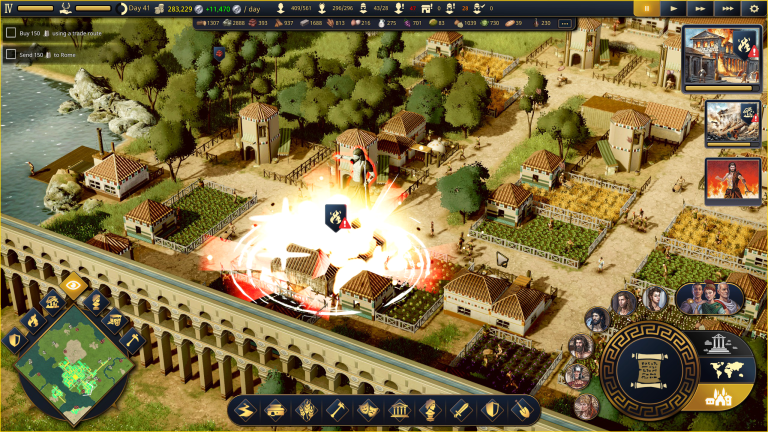
In terms of originality, the most unique thing about Citadelum is the Ancient Roman theme.
The use of the Gods in the game, and the blessings and curses they can inflict adds a touch of fantasy to the game, and really transports you to a different time, and is implemented well as both a mechanic and in the aesthetic of the game.
The use of the reservoirs and aqueducts in the game is something not seen in a ton of games like this, and fits perfectly with the theming of the game, whilst still having an actual function too – not just operating as a decorative item.
It doesn’t feel like there’s anything overly innovative in the game, but it has been executed to a tee, and the balancing feels unique because it functions so smoothly.
It’s definitely a game that stands out from other city builders, so for originality I’m rating Citadelum as Buzzed.

THE FINAL BREW
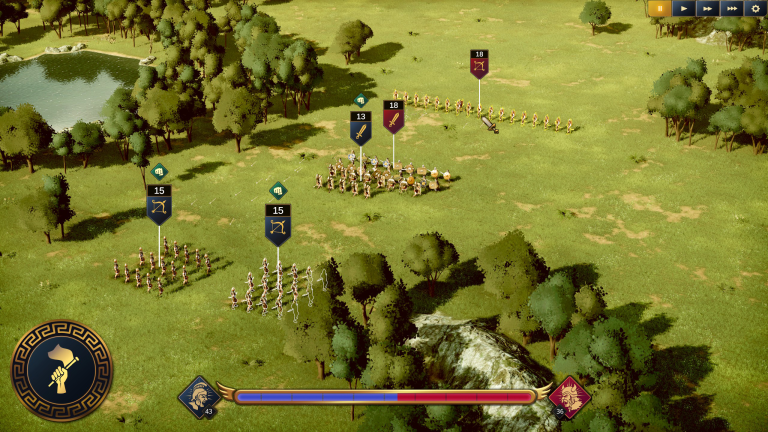
I’ve been looking forward to playing this game since it landed on my radar, and it did not disappoint. Citadelum somehow captures the nostalgia of early 2000s, whilst giving us a game that feels balanced and really just well done. It’s a game that is really easy to sink time into, and the shorter nature of each campaign makes it a great choice to play if you’ve only got an hour or two.
We’ve ground the beans, we’ve carefully weighed and pressed the grinds, and brewed this game down. Now it’s time for a taste test…. Citadelum is Buzzed.

Citadelum is available on Steam now! You can find more info here
Until next time, stay caffeinated!




